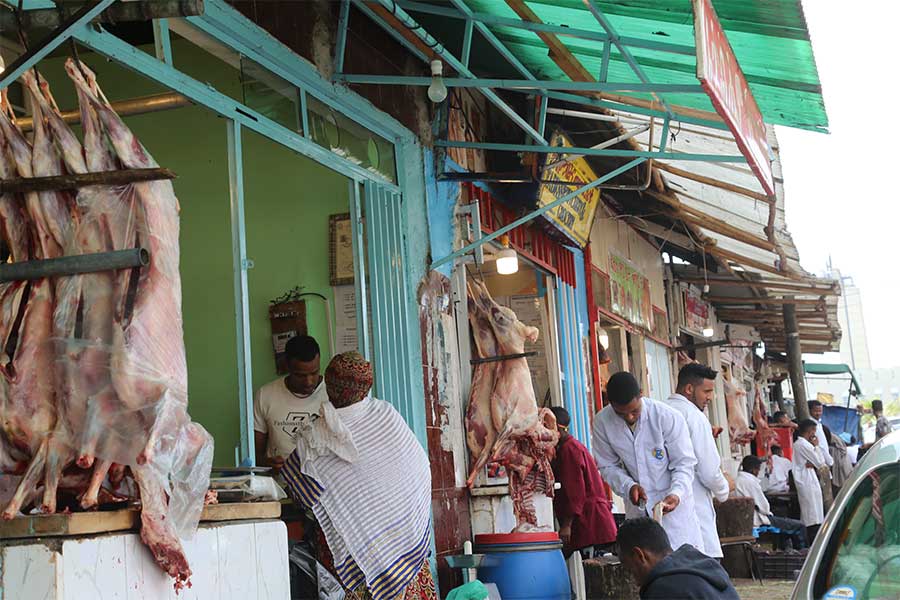
Feb 27 , 2021
By Christian Tesfaye
For the uninitiated, income and wealth could mean the same thing. The former is a flow of money; the latter are assets held by a person or a household over a certain time. For many around the world, savings could be considered wealth. In Ethiopia, not so much.
This is because the Birr is not something we can count on to accurately represent our level of wealth. For instance, last year, annual general inflation stood around 20pc. Most commercial banks have a deposit interest of eight percent. This means that a household or a person with 100,000 Br in savings just lost 12,000 Br of their wealth. Since there is usually a double-digit inflationary rate – at around 16pc on average over the past year – the Birr is essentially an unreliable asset to hold as wealth.
Matters are not getting any better, which is concerning to low-income households. Over the past three years, nearly everything has been spiking in price, including food items. It is getting harder to put food on the table, let alone dealing with sudden health emergencies or covering rent.
Usually, behind such pressures is the unabated growth in the supply of money by a government that attempted to stimulate the economy through infrastructure projects. Here, a lot of money printing was done to cover budget deficits.
This time around, it is also the government’s doing but in a more direct way that could help the health of Ethiopia’s economy.
One of these reasons is the depreciation of the Birr. The International Monetary Fund (IMF) applauds this move. It believes that the current value of the Birr does not reflect its actual demand. The country should move toward a market-clearing rate to reflect the Birr's real value, which the Fund believes that it still has yet to do, and address one of the structural imbalances in the economy.
But Ethiopia subsists with the help of a large import bill. Basic stuff like wheat and edible oil are imported as are raw materials for the construction and manufacturing sectors. This means that the more expensive major currencies get – as valued in Birr – the cost of living rockets higher. Previous administrations have also taken this pill, but perhaps not as aggressively. Over the past fiscal year, the value of the Birr has fallen by about a third of what it was.
Another critical factor feeding inflation is the gradual lifting of subsidies on several essential goods and services. Most recently, this was fuel, which is subsidised for several billions of Birr every year. Currently, a litre of gasoline costs 25.82 Br, compared to an equivalent of 43 Br in Kenya, 40 Br in Rwanda and 43 Br in Uganda, according to GlobalPetrolPrices.com. The government is also gradually lifting prices on electricity where, here too, the country has one of the lowest in the world. The same kilowatt per hour of electricity in Ethiopia cost about 23 times less than in neighbouring Kenya last June.
Much of these subsidies help urban households more than they do rural ones. Both car benzene and electricity consumption are highest among urban households, thus, these are not even particularly pro-poor subsidies, at least not in a direct way. This is especially the case for sugar, which is no longer being subsidised as well.
Much of this seems in line with the recommendations the IMF has been hammering for as long as it has been engaged with Ethiopia. They are not terrible pieces of advice, especially if there is budget discipline. There is some reason to be optimistic about this as well.
“The government has maintained considerable budgetary discipline, with moderate increases in the general government budget deficit, to 2.8pc of GDP and government debt to GDP, while total SOE debt to GDP has fallen,” Fitch, the credit rating agency, has reported.
No less encouraging is the introduction of a T-bill market to move away from central bank financing, which since demand for money is artificial fuels inflation.
There are two major problems though. One is the political crisis, with an armed conflict that erupted in November 2020. This is not necessarily the sort of climate that is conducive to a dynamic private sector. Policies meant to help this very sector will be undermined if the government cannot mitigate the prevalence of political violence.
Also pertinent is the matter of consent. Most economists – at least those who agree there is a science to capitalism – would commend the government’s policy prescriptions. I do as well, mainly if there is a commitment to budget discipline.
The question is: does the Ethiopian public?
Addressing the economy’s imbalances requires breaking some eggs to make an omelette. The eggs, in this case, are low-income households, especially in urban areas. These people will bear the harshest economic conditions, even if the logic behind current policies is that they would be fundamental to creating a more resilient and dynamic economy in the future.
For this, the government needs to come clean on the economic direction it is taking the country. It needs to get public buy-in, no matter how disciplined it may be in its spending and borrowing. Low-income households will pay the biggest sacrifice, and whatever its merits, it is as much a political discussion as it is an economic one.
PUBLISHED ON
Feb 27,2021 [ VOL
21 , NO
1087]


Agenda | Dec 21,2019

Viewpoints | Jan 13,2024

Radar | Jul 30,2022

Radar | Oct 31,2020

Radar | Mar 19,2022

Commentaries | Jun 26,2021

Radar | Jul 27,2025

Fortune News | May 29,2021

Editorial | Jul 01,2023

Advertorials | Aug 02,2024

Photo Gallery | 174176 Views | May 06,2019

Photo Gallery | 164401 Views | Apr 26,2019

Photo Gallery | 154538 Views | Oct 06,2021

My Opinion | 136650 Views | Aug 14,2021
Editorial | Oct 11,2025

Dec 22 , 2024 . By TIZITA SHEWAFERAW
Charged with transforming colossal state-owned enterprises into modern and competitiv...

Aug 18 , 2024 . By AKSAH ITALO
Although predictable Yonas Zerihun's job in the ride-hailing service is not immune to...

Jul 28 , 2024 . By TIZITA SHEWAFERAW
Unhabitual, perhaps too many, Samuel Gebreyohannes, 38, used to occasionally enjoy a couple of beers at breakfast. However, he recently swit...

Jul 13 , 2024 . By AKSAH ITALO
Investors who rely on tractors, trucks, and field vehicles for commuting, transporting commodities, and f...

Oct 11 , 2025
Ladislas Farago, a roving Associated Press (AP) correspondent, arrived in Ethiopia in...

Oct 4 , 2025
Eyob Tekalegn (PhD) had been in the Governor's chair for only weeks when, on Septembe...

Sep 27 , 2025
Four years into an experiment with “shock therapy” in education, the national moo...

Sep 20 , 2025
Getachew Reda's return to the national stage was always going to stir attention. Once...

Oct 12 , 2025
Tomato prices in Addis Abeba have surged to unprecedented levels, with retail stands charging between 85 Br and 140 Br a kilo, nearly triple...

Oct 12 , 2025 . By BEZAWIT HULUAGER
A sweeping change in the vehicle licensing system has tilted the scales in favour of electric vehicle (EV...

Oct 12 , 2025 . By NAHOM AYELE
A simmering dispute between the legal profession and the federal government is nearing a breaking point,...

Oct 12 , 2025 . By NAHOM AYELE
A violent storm that ripped through the flower belt of Bishoftu (Debreziet), 45Km east of the capital, in...